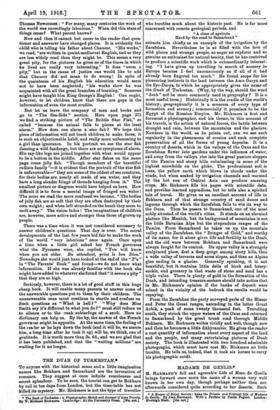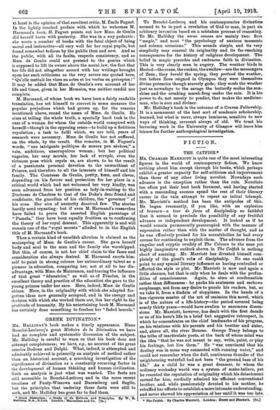MADAME DE GENUS.*
M. HAR3IAND'S full and agreeable Life of Mme. de Geniis brings forward once more the name of a woman very well known in her own day, though perhaps neither then nor afterwards considered quite according to her deserts. Such • A Keeper of Royal Secret,: being the Private and Political Life of Madame * The Dual) of Turkestan: a Physiographic Sketch and Account of some Travels, de Genlio. By Jean Harman& With a Preface by Emile Pagnet. London:
at least is the opinion of that excellent critic, M. &nileFaguet. In the lightly touched preface with which he welcomes M. Harmand's book, M. Faguet points out how Mme. de Geniis did herself harm with posterity. She was in a way pedantic : she wrote a number of books with the fatal object of being moral and instructive—all very well for her royal pupils, but found somewhat tedious by the public then and now. And as the public, with all its faults, respects consistency, and as Mme. de Geniis could not pretend to the genius which is supposed to lift its owner above the moral law, the fact that her life did not altogether accord with her writings brought upon her such criticisms as the very severe one quoted here, " Qu'elle mettait lea vices en actes et les vertus en preceptes !" It may be added that Mme. de Geniis's own account of her life and times, given in her Memoirs, was neither candid nor complete.
M. Harmand, of whose book we have here a fairly readable translation, has set himself to correct in some measure the popular prejudices which had grown up, for the reasons mentioned above, round the name of Mme. de Genlis. He aims at telling the whole truth, a specially hard task in the case of a woman for whom the outside world conspired with herself—though in the opposing sense—to build up a fictitious reputation ; a task to fulfil which, we are told, years of research were necessary. Mme. de Genlis has not suffered, on the whole, by the result. She remains, in M. Fagnet's words, " une intrigante politique de mceurs pen severes," a -vain, ambitious, unscrupulous woman ; but her political vagaries, her easy morals, her lack of scruple, even the virtuous pose which repels us, are shown to be the result of a passionate personal devotion to the unworthiest of Princes, and therefore to all the interests of himself and his family. The Comtesse de Genlis, pretty, keen, and clever, depending on his favour and protection for her place in a critical world which had not welcomed her very kindly, was soon advanced from her position as lady-in-waiting to the Duchesse de Chartres to that of the Duke's dear friend and confidante, the guardian of his children, the " governor " of his sons. Her airs of austerity deceived few. The stories hardly need repeating : but if even M. Harmand's researches have failed to prove the asserted English parentage of "Pamela," they have been equally fruitless as to confirming the theory of her royal descent. This apparently is and will remain one of the "royal secrets" alluded to in the English title of M. Harmand's book.
Thus a certain kind of unselfish altruism is claimed as the mainspring of Mme. de Geniis's career. She gave herself body and soul to the man and the family she 'worshipped. But this, of course, is not her chief claim to the fame and consideration she always desired. M. Harmand exerts him- self to paint in strong colours her extraordinary talent as a pioneer in education, comparing her, not at all to her dis- advantage, with Mme. de Maintenon, and tracing the influence of that great " educatrice," as well as of Fenelon, in the excellent theory and practice of the education she gave to the young princes under her care. Here, indeed, Mme. de Geniis shines. Here, in the originality with which she adapted for- gotten ideas now generally accepted, and in the energy and decision with which she worked them out, lies her right to the gratitude of humanity. By his entertaining book M. Harmand has certainly done something to freshen her "faded laurels."











































 Previous page
Previous page